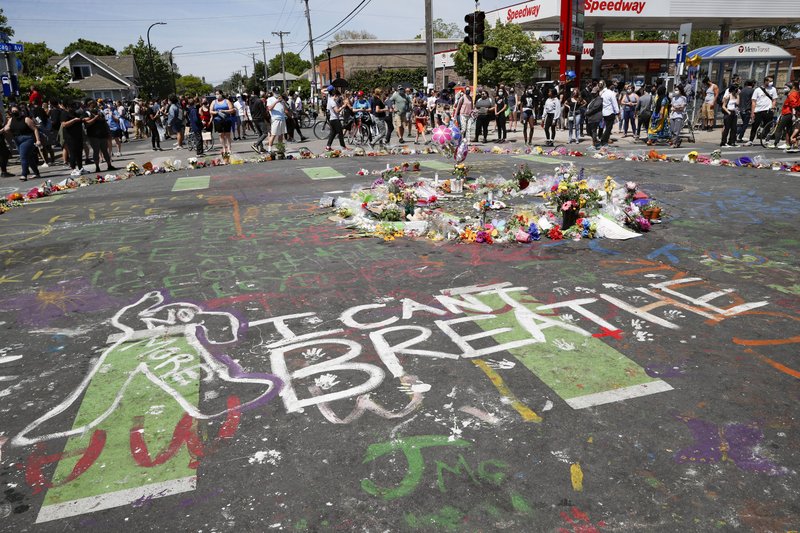MINNEAPOLIS -- Protesters took to the streets across America again Sunday, with violence flaring in pockets of largely peaceful demonstrations fueled by the killings of black people at the hands of police. A truck driver -- apparently deliberately -- drove into demonstrators in Minneapolis nearly a week after George Floyd pleaded with an officer pressing a knee into his neck that he could not breathe.
In Minneapolis, the tanker truck sped into a peaceful crowd of thousands on a closed highway, but no protesters appeared to have been hit, authorities said.
The Minnesota State Patrol tweeted that the driver was apparently trying to provoke protesters and was arrested. Protesters swarmed the truck and jumped on the hood, even as it kept moving. Police then came in force to clear the highway in the city where violence erupted after last week's death of Floyd, a black man. The protests quickly became national, spreading to dozens of cities large and small, and have lasted for days.
The officer who pressed his knee onto Floyd's neck for several minutes has been charged with murder, but protesters are demanding the other three officers at the scene be prosecuted. All four were fired.
In neighboring St. Paul, thousands gathered peacefully in front of the state Capitol, pledging to keep up the protests.
"We're Minnesota nice, but we're not Minnesota dumb, and we're not done," St. Paul Black Lives Matter organizer Darnella Wade said. "They sent us the military and we only asked them for arrests."
Minnesota's governor brought in thousands of National Guard soldiers to help quell violence that had damaged or destroyed hundreds of buildings in Minneapolis over days of protests. The immense deployment appeared to have worked Saturday night, when there was comparatively little destruction.
On Sunday, in a display of force, long lines of state patrolmen and National Guard soldiers were lined up in front of the Capitol, facing the demonstrators, with perhaps a dozen military-style armored vehicles behind them.
Tensions were heightened Sunday as a second group of demonstrators protesting the death of George Floyd in Minnesota sought to join others already at Lafayette Park near the White House but were blocked by police.
Police used pepper pods and flash bangs to try to disperse the crowd, but the demonstrators held tight.
The protesters sought to engage black police officers, seeking their support. "I been fighting this fight for 40 years. I been fighting this fight since the 80s. Do you think being on the outside is the solution or being on the inside and changing things is the solution," he asked them.
Gabrielle Labrosse-Ellis, 30, from Maryland, held a sign that said, "Humanize black lives."
"This is unacceptable. This is the last straw," she said. "It has to be."
Labrosse-Ellis said she planned to leave before dark because she feared a repeat of the violence that occurred Saturday night.
Outside Lafayette Park, protesters were milling around near cleaning crews who were clearing glass and boarding up windows that were broken during Saturday night's protest
Across America, demonstrators called again for an end to police violence.
Many also joined police in pleading for a stop to violence, saying it weakened calls for justice and reform.
"It only hurts the cause," said Danielle Outlaw, head of the police force in Philadelphia, where more than 200 people were arrested as fires and looting engulfed the heart of the city.
Disgust over generations of racism in a country founded by slaveholders combined with a string of recent racially charged killings to stoke the anger. Adding to that was angst from months of lockdowns brought on by the coronavirus pandemic, which has disproportionately hurt communities of color, not only in terms of infections but in job losses and economic stress.
The scale of the protests, sweeping from coast to coast and unfolding on a single night, rivaled the historic demonstrations of the civil rights and Vietnam War eras.
At the Minneapolis intersection where Floyd was killed, people gathered with brooms and flowers, saying it was important to protect what they called a "sacred space." The intersection was blocked with the traffic cones while a ring of flowers was laid out.
National on 06/01/2020